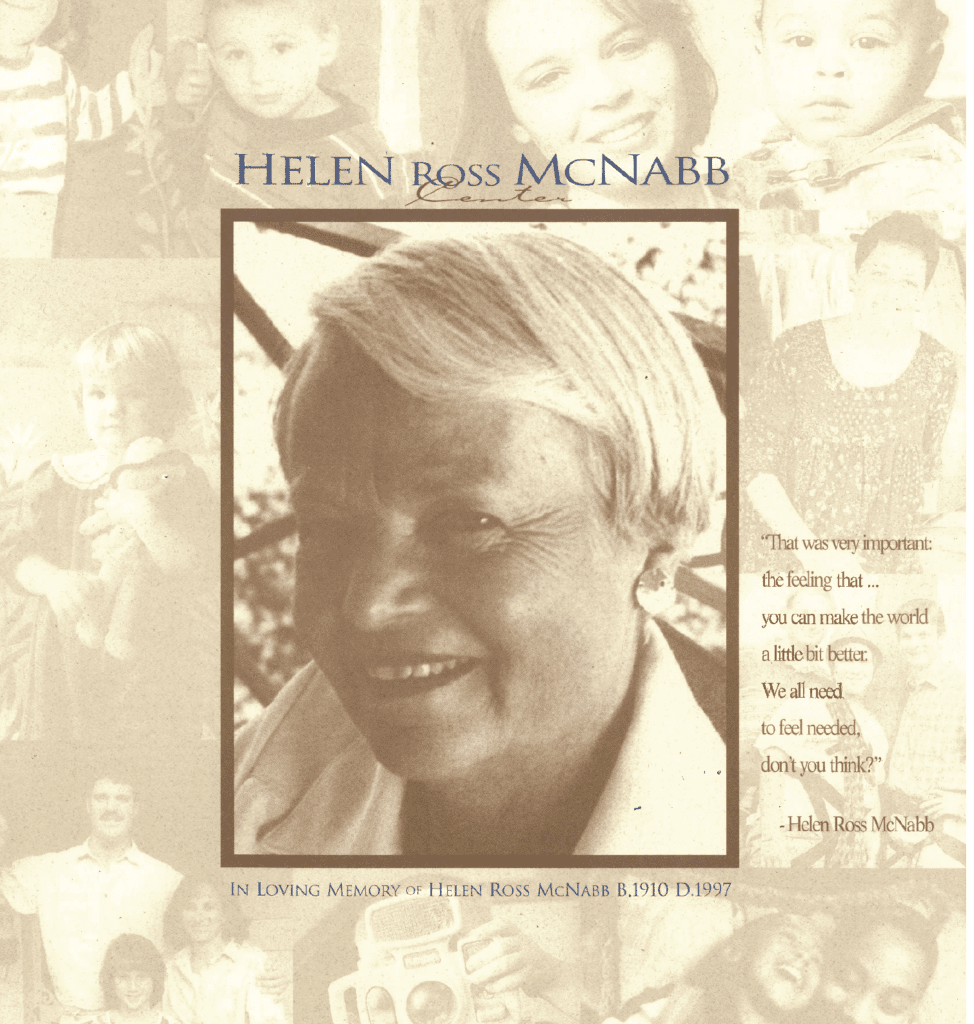Helen Ross McNabb

How many of you have vivid memories from when you were 4 ½ years old? Can you imagine what it might take to make such an impression that it would stay with you the rest of your life?
As a young child, Helen Ross had an experience that stirred her lifelong interest in mental health. Her childhood family home was on a hill about a half mile from the gate of Eastern State Hospital (This facility closed in 2012 as the Lakeshore Mental Health Institute). Her nanny had a friend who worked in one of the buildings at the hospital, and one day walked down the road to visit, taking young Helen with her. The year was 1914. The young girl found herself in a prison-like building, overcrowded and smelly, with faces inside peering out looking frightened and unkempt.
Throughout her childhood, a couple of other events helped foster her interest in mental illness. When she was eight or nine years old, a patient escaped from Eastern State Hospital in the middle of the night and went to the Ross’ house. The family could hear him cracking nuts with a nutcracker in their breakfast room. Her father called the hospital and the patient was escorted back. When she was a teenager, she and her mother were asked–as neighbors–to judge the Christmas decorations at the hospital. The impressions she took away from that visit were of dim lighting, drab colors, old clothes, shabby furniture, tiny rooms, boredom, and noticeable quiet. She appreciated the attendants, who worked 12 hours per day for a small amount of money, yet were caring enough to take great pains to decorate Christmas trees for the patients.
Helen later attended Wellesley College and received her undergraduate degree from The University of Tennessee in psychology and sociology in 1936. Shortly after graduation, she married Richard McNabb, a co-worker at Associated Charities. By 1941, they had three children and she had earned a master’s degree in psychology. While her husband was off to the war, she returned to UT as an instructor and began doing a little social work for the Home Service Department.
With the memories of her youth still vivid and reinforced daily through her social work and the experiences of GI’s returning from the war with emotional problems, she set out to change all that she could.
More than seventy years ago, a determined Helen Ross McNabb made an appeal to the Knoxville City Council for funds to help open a mental health agency for children. At this time there was a great need but little attention given to those suffering with mental illnesses. Due to her persuasive efforts one of the first community mental health clinics was established in the state of Tennessee. The clinic opened in a house near the University of Tennessee campus in 1948 with just three employees. The staff included a full-time psychologist, a secretary with a master’s degree in psychology, and a part-time psychiatrist.
Initially, the clinic’s goal was to serve children with the intent to provide services to all ages in the future. Patients were charged according to their ability to pay. Not surprisingly, the caseload grew rapidly and larger facilities were required. Knox County supplied additional funding in 1951 and a second psychologist was hired. In 1953, the small center took the opportunity to become independent of the City Health Department and became a non-profit corporation under its own board of directors. Adult services were officially added in 1955. Throughout the following decades the Center provided comprehensive community mental health services. When necessary, the Center would operate neighborhood satellite clinics to provide on-site services to outlying areas. It has always been the history of the Center to find ways to serve those in the community who have no advocates and no means to serve themselves.
Helen Ross McNabb spent much of her life caring for and advocating for the sickest and poorest in her community and in her state. To quote her, “That was very important; the feeling that I was part of an ongoing movement, that you can make the world a little bit better. We all need to feel needed, don’t you think?”
Helen Ross McNabb’s dream lives on in the concern, caring and empathy demonstrated daily by a dedicated staff.
